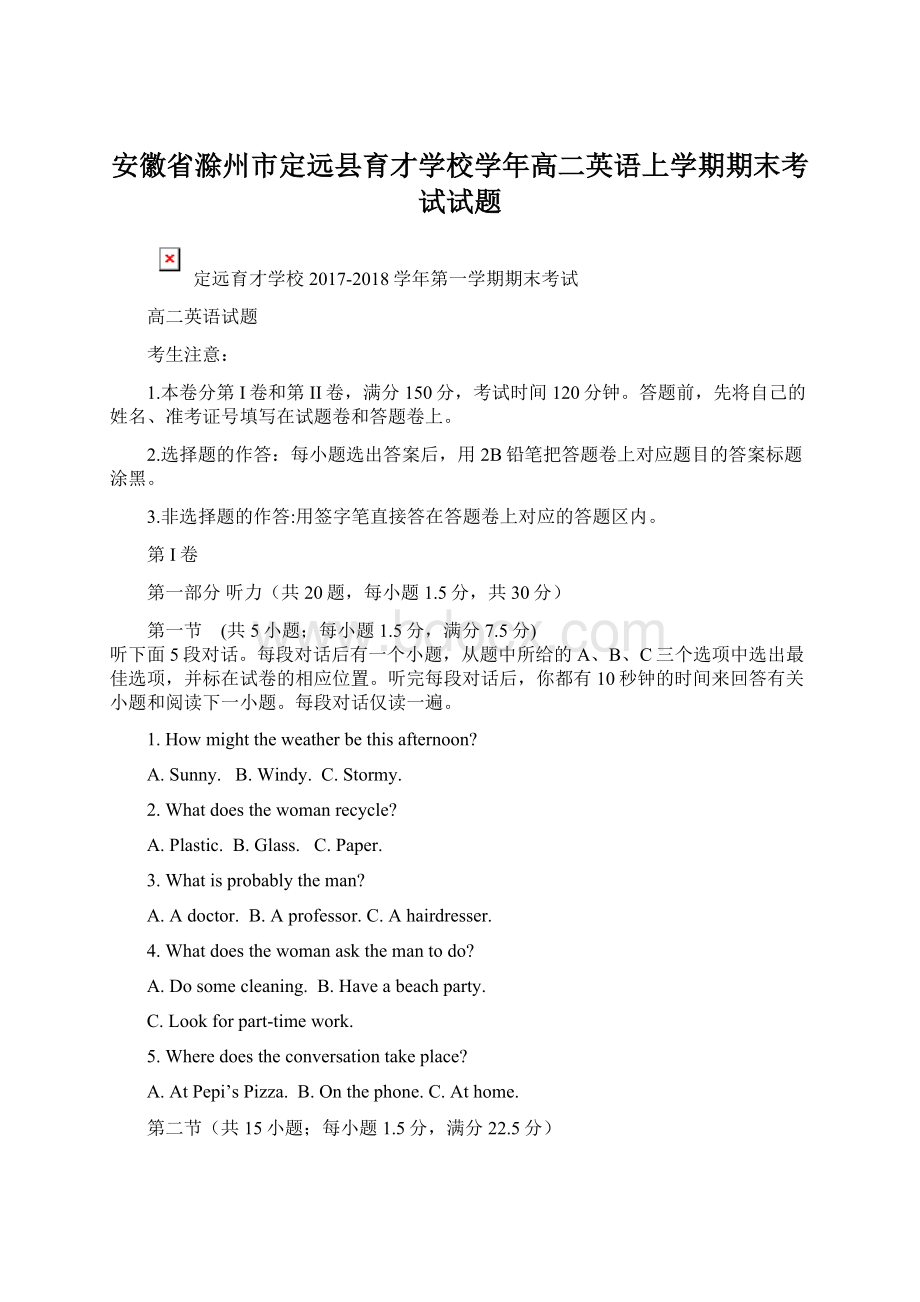安徽省滁州市定远县育才学校学年高二英语上学期期末考试试题Word文件下载.docx
《安徽省滁州市定远县育才学校学年高二英语上学期期末考试试题Word文件下载.docx》由会员分享,可在线阅读,更多相关《安徽省滁州市定远县育才学校学年高二英语上学期期末考试试题Word文件下载.docx(13页珍藏版)》请在冰豆网上搜索。

用签字笔直接答在答题卷上对应的答题区内。
第I卷
第一部分听力(共20题,每小题1.5分,共30分)
第一节 (共5小题;
每小题1.5分,满分7.5分)
听下面5段对话。
每段对话后有一个小题,从题中所给的A、B、C三个选项中选出最佳选项,并标在试卷的相应位置。
听完每段对话后,你都有10秒钟的时间来回答有关小题和阅读下一小题。
每段对话仅读一遍。
1.Howmighttheweatherbethisafternoon?
A.Sunny.B.Windy.C.Stormy.
2.Whatdoesthewomanrecycle?
A.Plastic.B.Glass.C.Paper.
3.Whatisprobablytheman?
A.Adoctor.B.Aprofessor.C.Ahairdresser.
4.Whatdoesthewomanaskthemantodo?
A.Dosomecleaning.B.Haveabeachparty.
C.Lookforpart-timework.
5.Wheredoestheconversationtakeplace?
A.AtPepi’sPizza.B.Onthephone.C.Athome.
第二节(共15小题;
每小题1.5分,满分22.5分)
听下面5段对话或独白。
每段对话或独白后有几个小题,从题中所给的A、B、C三个选项中选出最佳选项,并标在试卷的相应位置。
听每段对话或独白前,你将有时间阅读各个小题,每小题5秒钟;
听完后,各小题将给出5秒钟的作答时间。
每段对话或独白读两遍。
听第6段材料,回答第6-7题。
6.Whotookthephoto?
A.Ella.B.Ella’suncle.C.Ella’sbrother.
7.WhatdoweknowaboutJoe?
A.Hewearsglasses.B.HeisyoungerthanElla.C.HeistallerthanElla.
听第7段材料,回答第8、9题。
8.WhathappenedtoDavid?
A.Hefelloffahorse.B.Hewasbittenbyadog.
C.Hehadacaraccident.
9.Howdoesthemanfeelaboutlearningtodrive?
A.Interesting.B.Dangerous.C.Necessary.
听第8段材料,回答第10至12题。
10.Whatisthewomandoingwhenthemancomes?
A.Havingaclass.B.Havingameeting.
C.Correctinghomework.
11.Whydoesthemansaysorry?
A.Hebrokethewoman’salarmclock.
B.Hedidn'
tfinishhishomework.
C.Hewaslateforschoolagain.
12.Howmanytimeshasthemanforgottentobringhishomeworkthismonth?
A.Three.B.Four.C.Six.
听第9段材料,回答第13至16题。
13.Wheredoestheconversationmostlikelytakeplace?
A.Inarestaurant.B.Inapostoffice.C.Inashop.
14.Howlongwillthewomanwaitaccordingtitheman?
A.5minutes.B.10minutes.C.15minutes.
15.Whydoesthemanapologizeattheendoftheconversation?
A.Hesmokedinfrontofthewoman.B.Hemadeamistake.
C.Heshoutedatthewoman.
16.Whatcanweknowfromtheconversation?
A.Thewomanbookedatableinadvance.
B.Themanbroughtthewomanthewrongorder.
C.Thewomangotatableinthesmokingsection.
听第10段材料,回答第17至20题。
17.Whyisthespeakerusuallyhungrybylunchtime?
A.Shenevereatssnacksinthemorning.
B.Sheonlyhasadrinkforbreakfast.
C.Sheseldomhasbreakfast.
18.Whendoesthespeaker’slunchtimeend?
A.Atabout1:
15.B.Atabout2:
00.C.Atabout2:
15.
19.Whatdoesthespeakeralwaysdrinkforlunch?
A.Tea.B.Water.C.Coffee.
20.Whichmealistherichestmeal?
A.Breakfast.B.Lunch.C.Supper.
第二部分阅读理解(共两节,满分40分)
第一节(共15小题;
每小题2分,满分30分)
阅读下列短文,从每题所给的A、B、C和D四个选项中,选出最佳选项,并在答题卡上将该项涂黑。
A
Afamily’ssocioeconomicstatus(SES)affectsmorethanjusttheirlifestyle,anditcanalsoimpacttheintellectualdevelopmentofchildrenasearlyas18monthsold.ResearchersBettyHartandToddRisleyidentifiedwhattheycall“The30MillionWordGap”,whichshowsthatchildreninhigherincomefamilieswillhearapproximately30millionmorewordsthanchildreninfamiliesonwelfarebythetimetheyarethreeyearsold.Theresearchersfoundthatthesediscrepaneiesareevenvisibleinchildren’sbrainscans.Andthisgapdoesn’tjustdisappearafteragethree:
hearingadditionalwordssoearlyinlifeleadstohigherIQsandmoreacademicsuccesslater.Morerecently,theresulthasbeenreconfirmedbytheLENAFoundation,anon-profitorganization.
ToddRisely,co-authorofthestudy,emphasizedthatbeingbornintoalowSESfamilydoesNOTpreventachildfromrealizinghisorherfullpotentialorfromcompetingwithchildrenfromhighersocioeconomicstatusfamilies,especiallyifaparentorcaregiver,suchasagrandparent,engagesindailyandfrequentintelligentinteractionwiththechildduringthecriticalfirstthreeyearsoflife;
beingbornintoahighESEdoesNOTassurethatachildwillrealizehisorherfullpotential,especiallyifchild-raisingisoutsourcedtoanannywhodoesnothaveactiveinteractionwiththechildduringthefirstthreeyears.
“Languageislikenutritionforyourbrain.Themorewordsyouhear,themoreyourbraindevelops,”BettyHartsaid.“Ifyoudon’thavelanguage,youcan’tprogress.Languageisthekey.”Basedontheresearch,severalpilotprogramsdesignedtohelpparentsgetintothehabitoftalkingwiththeirbabies,apracticethatscientistssaycandowondersforachild’sfutureliteracyarebeingsetup.
21.Theunderlinedword“discrepancies”possiblymeans__________.
A.similaritiesB.possibilitiesC.differencesD.difficulties
22.Whatcanbeinferredfromthesecondparagraph?
A.ToddRisleyhasadisapprovingattitudetowardstheresearch.
B.Theresearchresultdoe